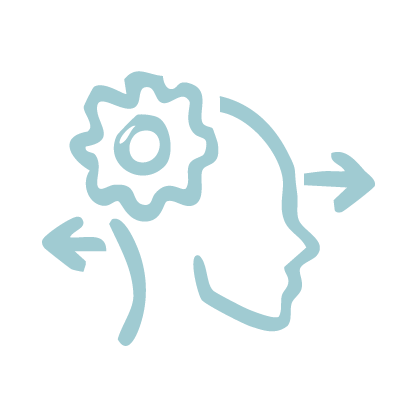Our Story
Meaningful Analytics was founded in 2023 by Clinical Behavior Analysts, Louisa Hussein and Brittany Sciarillo. With over 25 years of professional experience in the field of Applied Behavior Analysis, Louisa and Brittany desired to apply their expertise to serve the needs of individuals, families, and organizations seeking behavioral solutions to create a lasting impact. Their shared values for both effective and compassionate care, along with integrity in all they do, led them to create Meaningful Analytics.
Our Approach
At Meaningful Analytics, we believe that lasting behavior change happens by shaping the everyday physical and social environment of a child. Unlike traditional pediatric mental health treatments, which often overlook these factors, our approach is rooted in the science of behavior. Instead of relying on mental health diagnoses or medication, we focus on practical, evidence-based strategies that create meaningful and sustainable change.
Our team evaluates behaviors in context to determine their function and develop individualized interventions that empower both children and their caregivers. By optimizing environmental influences and teaching new skills, we help families achieve long-term success.
Behavior Analytic Approach
Our approach centers on identifying the function or cause of behavior and addressing it by teaching parents and caregivers how to modify environmental factors that shape behavior. We prioritize effective, efficient behavior change and long-term family well-being.
Key areas of our approach

Functional Behavior Assessments
Identifying the purpose of behaviors in specific contexts.

Individualized Treatment Planning
Creating customized interventions based on each child’s needs.

Caregiver Support & Training
Equipping families with the tools to encourage positive change.

Data Collection & Progress Monitoring
Using measurable outcomes to track success.

Social Validity
Ensuring family satisfaction with treatment outcomes.
Our approach does not focus on diagnosing mental health conditions or finding fault for behavioral concerns in the mind. Instead, we look to optimize these factors that we know influence behavior most directly.
BehavioralTreatment Consideration
Key areas of consideration

Learning History
How past experiences shape behavior.

Skills & Abilities
Current skills and areas of support.

Family & Lifestyle
How past experiences shape behavior.

Current Habits
Patterns of behavior that are repeated and reinforced.

Circumstances
Environmental triggers, expectations, and constraints.
Our Mission
Meaningful Analytics was created with the mission to make meaningful improvements in the lives of those we serve, by providing evidence-based, behavior analytic solutions to individuals, families, and businesses.
Our Vision
Our vision is to make behavior analysis accessible to everyone. We want our core values of Integrity, Sincerity, Diligence to be reflected in everything we do.
Frequently Asked Questions
Primary Care Behavioral Pediatrics (PCBP) is a subspecialty of clinical behavior analysis. Clinical behavior analysis is itself a specialty area of applied behavior analysis. PCBP addresses the primary care behavioral healthcare needs of children through science-based assessment and treatment, in collaboration with caregivers, pediatricians, and other pediatric healthcare providers. Common childhood concerns addressed include toileting issues, sleep challenges, picky eating, defiance, refusal behavior, oppositional behavior, and fears or anxiety. Primary Care Behavioral Pediatrics aims to fill a gap between primary care pediatric medicine and mainstream mental health.
McGinnis, J. C. (2024). Introduction to primary care behavioral pediatrics: A guide for behavior analysts. Routledge/Taylor & Francis Group.
For more information on Primary Care Behavioral Pediatrics: Visit this link
PCBP services are predominantly provided by specially trained physicians, behavioral psychologists, and clinical behavior analysts. Clinical behavior analysts are formally educated in the science of behavior and may hold either a master’s degree or a Ph.D.
While every client is different and the exact amount of time needed to achieve optimal outcomes can be difficult to estimate, most clients will achieve behavior change goals within 8-10 sessions. Typically, these sessions occur over 2-3 months. For many behavioral challenges, treatment results may begin to be seen within days of implementing the recommended strategies. The frequency of treatment sessions per week is determined on an individual basis and depends on the presenting concern and client preferences.
We do not require a diagnosis to provide services. We provide services to children with formal medical diagnoses, as well as children experiencing typical behavioral and mental health difficulties common to childhood. However, if you choose to file out-of-network with your insurance provider to cover the cost of our services, your claim may be denied without a formal medical diagnosis.
Absolutely! While our consultations and parent meetings are primarily conducted through telehealth, there are times when we need to assess the child in their environment. We frequently provide assessments and treatment in schools, daycares, homes, medical or therapy offices, and community settings when necessary for optimal care. We collaborate with your family and other professionals to ensure that all members of your child’s care team feel confident in the care plan.
Traditionally, many forms of treatment for pediatric behavioral challenges have centered around mental health therapies. You may have heard of talk therapy or play therapy. These therapies typically do not modify environmental and social factors impacting the child’s behavior. Without this crucial component, which is necessary for establishing lasting behavior change, these therapies often show limited efficacy and fail to produce desired outcomes. Contrary to popular belief, there is limited scientific support for these types of mental health approaches.
In comparison, behavior analytic strategies are backed by decades of research and supported by national pediatric and mental health organizations. Taking a behavior analytic approach through Primary Care Behavioral Pediatrics, we focus on the family, working with both the child and the parents to modify lifestyle factors and teach new skills that support and encourage behavior change. We assess individual learning histories and preferences to account for past experiences impacting behavior and gain insight into how current environmental circumstances might affect behavior.
Glad you asked! Monitoring progress is one of the cornerstones of behavior analysis and our treatment approach. We collect detailed data throughout the assessment and treatment process to ensure measurable outcomes. Before treatment begins, we establish a baseline by assessing the current levels of the behaviors we aim to address. By tracking changes over time, we can objectively measure the impact of our interventions. During each appointment, we discuss with parents the rate, intensity, or other measure of the target behavior. Of equal importance, we continuously assess your experience with the strategies prescribed and the impact it is having on your child’s behavior. High client satisfaction and effective treatment is our top priority, so we collect parent ratings both during treatment and after case closure.
The first thing you can do is to provide us with as much detailed information as possible on your intake and initial assessment paperwork, as well as during our appointments. The more candidly we can discuss the issues at hand, the more likely we will be able to find efficient and effective strategies. Please share any information you feel is relevant to the situation. Rest assured, that even if some questions seem unrelated, the information is important to our process. We are always happy to answer questions about why we need information.
The most effective way to ensure success is to inform us immediately if you experience difficulty implementing our prescribed procedures or protocols. We provide parents with direction and guidance on specific behavioral strategies we prescribe. We individualize our treatment with your family dynamic in mind to minimize obstacles, and we try to anticipate challenges you may face and prepare you with solutions. It is no surprise to us when unexpected family obstacles arise. We have a communication tool on our client portal that allows back-and-forth messaging, and we are always willing to give you additional guidance and make modifications.
Attending appointments and following through with prescribed treatment strategies is key! We know this requires trusting us, and we will work to earn and maintain that trust.
